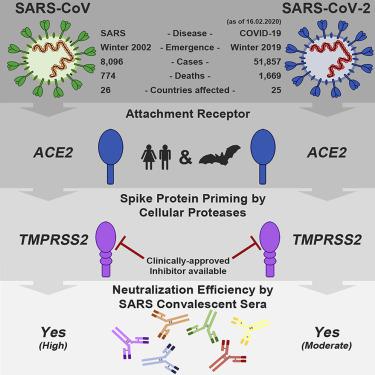Our official English website, www.x-mol.net, welcomes your
feedback! (Note: you will need to create a separate account there.)
SARS-CoV-2 Cell Entry Depends on ACE2 and TMPRSS2 and Is Blocked by a Clinically Proven Protease Inhibitor.
Cell ( IF 45.5 ) Pub Date : 2020-03-05 , DOI: 10.1016/j.cell.2020.02.052 Markus Hoffmann 1 , Hannah Kleine-Weber 2 , Simon Schroeder 3 , Nadine Krüger 4 , Tanja Herrler 5 , Sandra Erichsen 6 , Tobias S Schiergens 7 , Georg Herrler 8 , Nai-Huei Wu 8 , Andreas Nitsche 9 , Marcel A Müller 10 , Christian Drosten 3 , Stefan Pöhlmann 2
Cell ( IF 45.5 ) Pub Date : 2020-03-05 , DOI: 10.1016/j.cell.2020.02.052 Markus Hoffmann 1 , Hannah Kleine-Weber 2 , Simon Schroeder 3 , Nadine Krüger 4 , Tanja Herrler 5 , Sandra Erichsen 6 , Tobias S Schiergens 7 , Georg Herrler 8 , Nai-Huei Wu 8 , Andreas Nitsche 9 , Marcel A Müller 10 , Christian Drosten 3 , Stefan Pöhlmann 2
Affiliation

|
The recent emergence of the novel, pathogenic SARS-coronavirus 2 (SARS-CoV-2) in China and its rapid national and international spread pose a global health emergency. Cell entry of coronaviruses depends on binding of the viral spike (S) proteins to cellular receptors and on S protein priming by host cell proteases. Unravelling which cellular factors are used by SARS-CoV-2 for entry might provide insights into viral transmission and reveal therapeutic targets. Here, we demonstrate that SARS-CoV-2 uses the SARS-CoV receptor ACE2 for entry and the serine protease TMPRSS2 for S protein priming. A TMPRSS2 inhibitor approved for clinical use blocked entry and might constitute a treatment option. Finally, we show that the sera from convalescent SARS patients cross-neutralized SARS-2-S-driven entry. Our results reveal important commonalities between SARS-CoV-2 and SARS-CoV infection and identify a potential target for antiviral intervention.
更新日期:2020-04-20









































 京公网安备 11010802027423号
京公网安备 11010802027423号